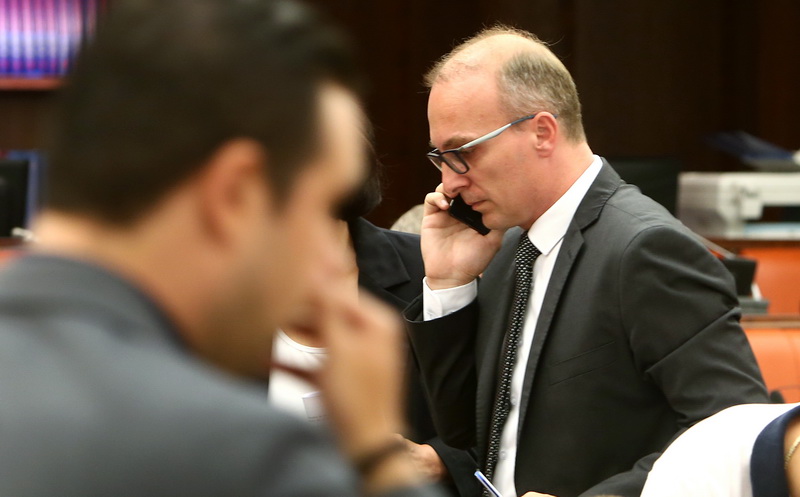The prosecution law “outlives” the Brussels decision

Mid-October, i.e. before Brussels’ decision to (not) get a date for accession negotiations with the EU, turned out not to be the deadline for adopting the prosecution law. The political parties are blaming their political opponents, accusing them of failing to pass the law, which, while undermined by the ruling of the European powers, is now cited by some diplomats as one of the factors contributing to the eventual negative assessment.
Representatives of the government and opposition keep in touch on a daily basis and are trying to find a solution, but their stances are still on opposite sides.
“There are no signals that a meeting of the working groups needs to be scheduled”, said the Ministry of Justice.
VMRO-DPMNE confirms that there is still no compromise, but the party believes that the problem will have to be resolved in due time.
“We are trying to find common ground through informal dialogue, but at the moment the ruling party’s focus is on getting a date, so the situation remains a status quo. But we should all be aware that the prosecution law will have to be passed soon, whether we get a date or not. If we do get a date, then the law will be a benchmark in chapters 23 and 24 of the accession negotiations. If we do not, the adoption of the law will probably be written in the Council’s conclusion of a possible date at some other time”, sources from the main opposition party told Nezavisen Vesnik.
According to the latest information we have received from both parties, it is only agreed that the head of the newly formed Prosecutor’s Office for Organized Crime and Corruption will be nominated by the opposition. But apart from the form, the essence is different in the ruling party’s headquarters on Bihac Street and VMRO-DPMNE’s so-called “White Palace” headquarters.
VMRO-DPMNE sources briefed Nezavisen Vesnik that they have proposed the current Basic Prosecution for Organized Crime and Corruption, led by Vilma Ruskovska to merge with the disbanded Special Public Prosecutor’s Office. Ruskovska will have guaranteed independence and will handle the “April 27” and “Racket” cases, just as she did before. But the head of the new prosecution will be selected by the opposition. As for the SPO cases now being transferred to the Public Prosecutor’s Office, a legal framework could be created so that they can be transferred to the new Prosecutor’s Office, which will be responsible for handling organized crime and high-profile corruption cases.
SDSM, on the other hand, believes that VMRO-DPMNE sticks to the idea of blocking all cases that have been opened by the SPO. As little progress is made, they point out that VMRO-DPMNE has so far not formally accepted a merger of the Prosecutor’s Office for organized crime and corruption with the SPO, and now the party says it does not mind. The ruling SDSM also demands that all new prosecutors from the former SPO be transferred to the new Prosecutor’s Office for at least one year, so that the cases won’t go into legal vacuum, obsolescence or delay of processes, but VMRO-DPMNE disagrees.
The transfer of cases from the special to the ordinary prosecution excluded the need for urgent resolution of the problem.
However, Dutch Foreign Minister Stef Blok said a few days ago that North Macedonia had made a great effort to get a date for opening the accession negotiations, but that another one was needed: the law on public prosecution. Earlier, during a debate in the Dutch parliament, Block said he blamed the opposition for failing to negotiate the law in our country, but a “no” vote from Brussels would punish the government in Skopje.
Joveski will sign the salaries for SPO
About 80 Special Prosecutor’s Office staff are still waiting for September’s salary after former head Special Prosecutor Katica Janeva was dismissed, so there was no one to sign the orders.
The Ministry of Justice has sent the decision to the Parliament and we expect it to be put to a session. By law, the state prosecutor will be empowered to decide on the allocation of staff, to sign a salary, or to virtually replace the special public prosecutor with all employee powers.
However, day-to-day staff alert that, apart from the unpaid salary, the institution has not paid any electricity or rent bills, and it is increasingly certain that the building where the so-called “bombs” were to be kept safe will remain without electricity. If this happens, neither the security cameras nor the alarms will work, and the wiretapped conversations will be left unprotected, meaning that there will be no one to guarantee their safety.
The SPO had 92 employees, including ten special prosecutors, who have now been transferred to their previous prosecution offices.
Goran Adamovski